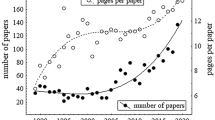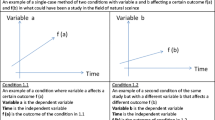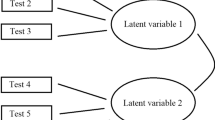Summary
An account is given of the history and present status of Psychological Research / Psychologische Forschung on the occasion of the 50th volume. Psychologische Forschung, which was founded in 1921 by W. Köhler, K. Koffka, M. Wertheimer, K. Goldstein, and H. W. Gruhle, is today almost exclusively known as the journal of the Berlin school of Gestalt psychology. Though a citation analysis provides strong evidence for the pervasiveness of this image, consideration of the founders' intentions and of the contents of the journal shows that initially it was not meant to serve the interests of a particular “school” of psychology and assumed this role only by a complex combination of historical circumstances. Significant events in the history of the journal include its temporary suspension in 1938, its refoundation in 1949, and its conversion into Psychological Research in 1974. The journal's current place in the publication network of psychology is described by means of a citation analysis. The closest affinities of the journal are with American journals in the “perception and performance” field and other English-language European journals of general experimental psychology.
Similar content being viewed by others
References
Ash, M. G. (1985a). Ein Institut und seine Zeitschrift. Zur Geschichte des Berliner Psychologischen Instituts und der Zeitschrift “Psychologische Forschung” vor und nach 1933. In: C. F. Graumann (Ed.), Psychologie im Nationalsozialismus (pp. 113–137). Berlin, Heidelberg, New York: Springer.
Ash, M. G. (1985b). The role of developmental concepts in the history of Gestalt theory: The work of Kurt Koffka. In: G. Eckhardt, W. G. Bringmann, & L. Sprung (Eds.), Contributions to a history of developmental psychology (pp. 341–358). Berlin, New York, Amsterdam: Mouton.
Becker, J. H. (1980). Englischsprachige Publikationen deutscher Psychologen. Trends, Inhalte, Herkunft, internationale Aufnahme. Psychologische Beiträge, 22, 356–371.
Brown, J. F. (1931a). The visual perception of velocity. Psychologische Forschung, 14, 199–232.
Brown J. F. (1931b). On time perception in visual movement fields. Psychologische Forschung, 14, 233–248.
Brown, J. F. (1931c). The thresholds for visual movement. Psychologische Forschung, 14, 249–268.
Dembo, T. (1931). Der Ärger als dynamisches Problem. Psychologische Forschung, 15, 1–144.
Duncker, K. (1929). Über induzierte Bewegung. Psychologische Forschung, 12, 180–259.
Ellis, W. D. (1938). A source book of Gestalt psychology. New York: Harcourt & Brace.
Eysenck, H.-J. (1980). A comment on the Traxel-Lienert discussion regarding publication in English by German psychologists. Psychologische Beiträge, 22, 372–376.
Geuter, U. (1984). Die Professionalisierung der deutschen Psychologie im Nationalsozialismus. Frankfurt/M.: Suhrkamp.
Goldmeier, E. (1938). Über Ähnlichkeit bei gesehenen Figuren. Psychologische Forschung, 21, 146–208.
Gottschaldt, K. (1926). Über den Einfluß der Erfahrung auf die Wahrnehmung von Figuren: I. Über den Einfluß gehäufter Einprägung von Figuren auf ihre Sichtbarkeit in umfassenden Konfigurationen. Psychologische Forschung, 8, 261–317.
Gottschaldt, K. (1929). Über den Einfluß der Erfahrung auf die Wahrnehmung von Figuren: II. Vergleichende Untersuchung über die Wirkung figuraler Einprägung und den Einfluß spezifischer Geschehensverläufe auf die Auffassung optischer Komplexe. Psychologische Forschung, 12, 1–87.
Gurwitsch, A. (1929). Phänomenologie der Thematik und des reinen Ich. Studien über die Beziehungen von Gestalttheorie und Phänomenologie. Psychologische Forschung, 12, 279–381.
Hepp, M. (1985). Die Ausbürgerung deutscher Staatsangehöriger 1933–45 nach den im Reichsanzeiger veröffentlichten Listen. München, New York, London, Paris: Saur.
Hoppe, F. (1931). Erfolg und Mißerfolg. Psychologische Forschung, 14, 1–62.
Karsten, A. (1928). Psychische Sättigung. Psychologische Forschung, 10, 142–255.
Koffka, K. (1921). Grundlagen der psychischen Entwicklung. Osterwieck/Harz: Zickfeldt.
Koffka, K. (1927). Bemerkungen zur Denk-Psychologie. Psychologische Forschung, 9, 263–283.
Köhler, W. (1925). Komplextheorie und Gestalttheorie. Antwort auf G. E. Müllers Schrift gleichen Namens. Psychologische Forschung, 6, 358–416.
Köhler, W. (1926). Zur Komplextheorie. Psychologische Forschung, 8, 236–243.
Köhler, W. (1928). Bemerkungen zur Gestalttheorie. Im Anschluß an Rignanos Kritik. Psychologische Forschung, 11, 188–234.
Köhler, W. (1967). Gestalt psychology. Psychologische Forschung, 31, XVIII-XXX.
Köhler, W. & von Restorff, H. (1937). Zur Theorie der Reproduktion. Psychologische Forschung, 21, 56–109.
Kopfermann, H. (1930). Psychologische Untersuchungen über die Wirkung zweidimensionaler Darstellungen körperlicher Gebilde. Psychologische Forschung, 13, 293–264.
Kudlien, F. (1985). Ärzte im Nationalsozialismus. Köln: Kiepenheuer & Witsch.
Lewin, K. (1926). Vorsatz, Wille und Bedürfnis. Psychologische Forschung, 7, 330–385.
Lewin, K. (1934). Der Richtungsbegriff in der Psychologie: der spezielle und allgemeine hodologische Raum. Psychologische Forschung, 19, 249–299.
Lienert, G. A. (1977). Über Werner Traxel: Internationalität oder Provinzialismus, zur Frage: Sollten Psychologen in English publizieren? Psychologische Beiträge, 19, 487–492.
Metraux, A. (1985). Der Methodenstreit und die Amerikanisierung der Psychologie in der Bundesrepublik 1951–1970. In: M. G. Ash & U. Geuter (Eds.), Geschichte der deutschen Psychologie im 20. Jahrhundert (pp. 225–251). Opladen: Westdeutscher Verlag.
Metzger, W. (1935). Tiefenerscheinungen in optischen Bewegungsfeldern. Psychologische Forschung, 20, 195–260.
Ovsiankina, M. (1928). Die Wiederaufnahme unterbrochener Handlungen. Psychologische Forschung, 11, 302–379.
Prinz, W. (1985). Ganzheits- und Gestaltpsychologie und Nationalsozialismus. In: C. F. Graumann (Ed.), Psychologie im Nationalsozialismus (pp. 89–112). Berlin, Heidelberg, New York, Tokyo: Springer.
Restorff, H. v. (1933). Über die Wirkung von Bereichsbildungen im Spurenfeld. Psychologische Forschung, 18, 299–342.
Scheerer, E. (1980). Gestalt psychology in the Soviet Union: I. The period of enthusiasm. Psychological Research, 41, 113–132.
Scheerer, E. (1985). Organische Weltanschauung und Ganzheitspsychologie. In: C. F. Graumann (Ed.), Psychologie im Nationalsozialismus (pp. 15–54). Berlin, Heidelberg, New York, Tokyo: Springer.
Schroff, E. (1928). Über Gestaltauffassung bei Kindern im Alter von 6 bis 14 Jahren. Psychologische Forschung, 11, 235–266.
Simmel, M. L. (1968). Kurt Goldstein 1878–1965. In: M. L. Simmel (Ed.), The reach of mind: Essays in memory of Kurt Goldstein (pp. 3–12). New York: Springer.
Social Sciences Citation Index (1971–1986). Philadelphia: Institute for Scientific Information.
Sprung, L. (1987). Wolfgang Köhler in den USA — Marginalien zu einem zweiten Leben. Gestalt Theory, 9, 299–305.
Süllwold, F. (1980). Wissenschaftssprache und Originalität. Psychologische Beiträge, 22, 191–203.
Traxel, W. (1975). Internationalität oder Provinzialismus? Über die Bedeutung der deutschen Sprache für deutschsprachige Psychologen. Psychologische Beiträge, 17, 584–594.
Traxel, W. (1979). “Publish or Perish” — auf deutsch oder auf englisch? Psychologische Beiträge, 21, 62–77.
Wertheimer, M. (1912). Über das Denken der Naturvölker: I. Zahlen und Zahlengebilde. Zeitschrift für Psychologie, 60, 321–378.
Wertheimer, M. (1923). Untersuchungen zur Lehre von der Gestalt. Psychologische Forschung, 4, 301–350.
Wohlwill, J. F. (1987). German psychological journals under the Nazis: A history of contrasting paths. Journal of the History of the Behavioral Sciences, 23, 169–185.
Zeigarnik, B. (1927). Über das Behalten von erledigten und unerledigten Handlungen. Psychologische Forschung, 9, 1–85.
Author information
Authors and Affiliations
Rights and permissions
About this article
Cite this article
Scheerer, E. Fifty volumes of Psychological Research/Psychologische Forschung . Psychol. Res 50, 71–82 (1988). https://doi.org/10.1007/BF00309206
Received:
Issue Date:
DOI: https://doi.org/10.1007/BF00309206




